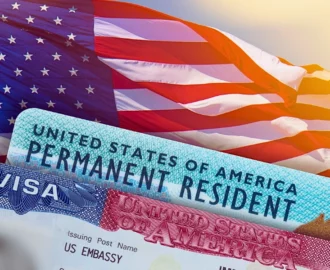Eligible immigrants in Illinois may apply for an adjustment of status to become lawful permanent residents. To apply for an adjustment of status, it is important for immigrants to understand whether or not they are eligible, the correct forms to complete, and whether they might need someone else to serve as a sponsor. After the application is filed, there are several steps that will take place before a decision is made. Immigrants should be prepared for each step and complete their petitions correctly.
Eligibility for Adjustment of Status
An adjustment of status is the process that certain immigrants must go through if they want to become lawful permanent residents. Immigrants who may be eligible to apply for an adjustment of status include spouses, immediate family members, asylees or refugees, people who have won visas in the diversity lottery, Cuban nationals, and certain highly skilled workers who have employment-based visas.
There are some disqualifying factors for people who fall within the eligibility categories. People who have been convicted of certain crimes or who have disqualifying health conditions may be inadmissible. People who have previously broken the U.S. immigration laws, are considered to be threats to national security, or who are believed to be likely to become dependent on public welfare may also be deemed to be inadmissible.
Applying for Adjustment of Status
To apply for an immigration adjustment of status, eligible immigrants must complete form I-485 along with documents that prove their eligibility. These include their birth certificates, USCIS medical examinations, passports, and proof that their sponsors will be able to support them financially. They may submit secondary evidence of one of the required documents are not available. They must also pay the fee of $1,225.
After the application is filed, immigrants can expect the process to take up to 11 months. During that time, they may have to attend an interview if the USCIS decides that one is necessary. Immigrants might also receive requests for more information and must respond with the requested documents. Once the application is processed and the USCIS makes its decision, it will issue the immigrant a decision. If the immigrant’s application is denied, he or she may file a motion to reconsider or a motion to reopen.




